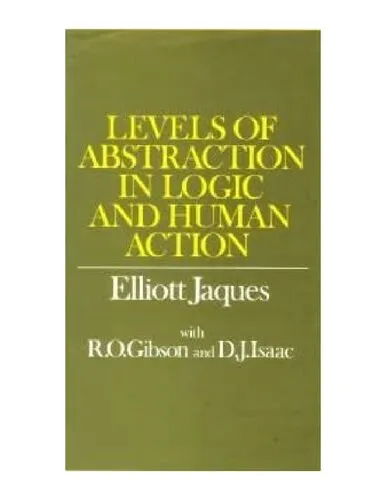Levels of abstraction in logic and human action: A theory of discontinuity in the structure of mathematical logic, psychological behaviour, and social organization
4.2
Reviews from our users

You Can Ask your questions from this book's AI after Login
Each download or ask from book AI costs 2 points. To earn more free points, please visit the Points Guide Page and complete some valuable actions.Welcome to the exploration of the intricate layers of abstraction in logic and human actions as articulated in 'Levels of abstraction in logic and human action: A theory of discontinuity in the structure of mathematical logic, psychological behaviour, and social organization'. Authored by Elliott Jaques in collaboration with R.O. Gibson and D.J. Isaac, this book delves deep into the fabric of human thought, delineating the discontinuities that differentiate our cognitive processes, social organizations, and logical reasoning.
Detailed Summary of the Book
The book establishes a comprehensive theory of levels of abstraction, which serves as a framework to understand the apparent discontinuities across various domains including logic, psychology, and sociology. By investigating these discontinuities, the authors strive to provide insights into how human beings compartmentalize information, reason abstractly, and behave within social constructs. The text initiates with foundational concepts of mathematical logic and progressively introduces the psychological and sociological dimensions, creating a cohesive narrative that links abstract logical processes with observable human behavior.
Throughout the chapters, the book systematically details how logic is not just a static component of mathematics but plays a dynamic role in human action. The authors propose that as people engage with more complex levels of abstraction, their reasoning patterns and social behaviors undergo significant changes. For instance, how a child perceives the world compared to an adult corresponds to different levels of abstraction in cognitive development and social understanding.
Key Takeaways
- Understanding discontinuities in logic and behavior helps to unravel complex human actions.
- Levels of abstraction provide a vital perspective in cognitive science and organizational theory.
- The transformation from one level of abstraction to another is key to developmental processes in humans.
- The framework can be applied to enhance structures in artificial intelligence by mimicking human-like abstraction levels.
Famous Quotes from the Book
While specific quotes from the book speak volumes about the intricate relationships between logic, behavior, and societal structures, renowned excerpts highlight the groundbreaking thoughts introduced by the authors, underscoring the significance of understanding abstraction as a dynamic and transformative process in both personal and societal contexts.
Why This Book Matters
The significance of this book lies in its pioneering approach to integrating diverse aspects of human experiences—be it cognitive, psychological, or social—into a coherent theory of abstraction. As societies and technologies evolve, understanding these underlying concepts becomes crucial for progress in fields such as artificial intelligence, education, and organizational management. By offering a structured method to grasp these transitions, the book serves as an invaluable resource for scholars and practitioners alike, promoting a deeper understanding of the complex interplay between thought and action.
In conclusion, 'Levels of abstraction in logic and human action: A theory of discontinuity in the structure of mathematical logic, psychological behaviour, and social organization' pushes the boundaries of conventional thinking. It urges readers to contemplate the unseen influences that levels of abstraction exert on our daily lives, persuading them to reconsider the simplicity of actions through a sophisticated analytical lens.
Free Direct Download
You Can Download this book after Login
Accessing books through legal platforms and public libraries not only supports the rights of authors and publishers but also contributes to the sustainability of reading culture. Before downloading, please take a moment to consider these options.
Find this book on other platforms:
WorldCat helps you find books in libraries worldwide.
See ratings, reviews, and discussions on Goodreads.
Find and buy rare or used books on AbeBooks.
1213
بازدید4.2
امتیاز50
نظر98%
رضایتReviews:
4.2
Based on 0 users review
"کیفیت چاپ عالی بود، خیلی راضیام"
Questions & Answers
Ask questions about this book or help others by answering
No questions yet. Be the first to ask!


